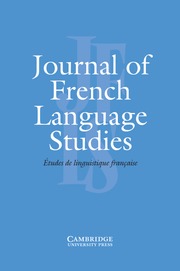Article contents
Authority, prescriptivism and the French standard language§
Published online by Cambridge University Press: 10 October 2008
Abstract
Prescriptive attitudes to language seem to be more deeply engrained in France than in many other speech-communities. This article traces their development between the sixteenth century and the present day within the model of language standardization proposed by E. Haugen and in the light of the notion of ‘standard ideology’ proposed by J. and L. Milroy. It will be argued that early definitions of what was considered ‘the best French’ were based simply on the observed usage of ‘the best people’; later it was felt that the standard required more permanent jusitification, giving rise to the idea that the ‘best French’ was the ‘best’ because it was the variety most closely in line with clarity and reason; a third stage was reached with the French Revolution when this variety of French became mandatory for everyone wishing to be considered ‘French’ and ‘reasonable’. Powerful institutional forces are engaged in promoting and maintaining this ideology in contemporary France, but excessive rigidity in the traditional standard in the face of the alternative norms which exert countervailing pressures on speakers could lead to a sitution of diglossia.
- Type
- Overview article
- Information
- Copyright
- Copyright © Cambridge University Press 1991
Footnotes
This article is a development of a paper originally given in Bristol University on 9 March 1990, under the title ‘The development of the ideology of the standard in France, 1500–1800’. I am most greatful to Professors G. Price and J. Milroy for their valuable comments on an earlier version of what is printed here.
References
REFERENCES
- 10
- Cited by


